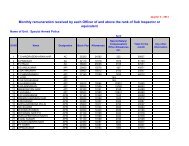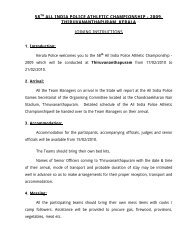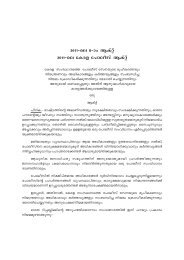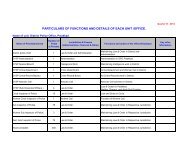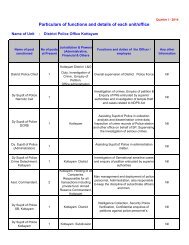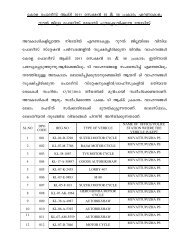Janamaithri Suraksha Project - Kerala Police
Janamaithri Suraksha Project - Kerala Police
Janamaithri Suraksha Project - Kerala Police
Create successful ePaper yourself
Turn your PDF publications into a flip-book with our unique Google optimized e-Paper software.
taking the feedback from the field functionaries. It is an example of prudency in policy making. Once<br />
the pilots became successful, the scheme was extended to other police stations in the state, from<br />
twenty to two hundred and forty eight at present. Simultaneously planning for resource augmentation<br />
and scaling up during the implementation phase shows the foresight of the policy entrepreneurs.<br />
During the period of scaling up, the policy got the acceptance of all the actors and underwent the<br />
process of refinement. ‘Implementation is beset with agency problem.’ The agent (field functionaries)<br />
may not always act according to the interest and instructions of the principal (the police department<br />
or the government). Guidance, mentoring, aid and support to the field functionaries addressed the<br />
agency problem in <strong>Kerala</strong>. Exercising good old superintendence and control, periodically reviewing<br />
and issuing clarifications are meant to ensure that the ‘intent’ and ‘design’ of the policy conforms to<br />
the implementation. The government of <strong>Kerala</strong> appointed a senior police officer as State Level Nodal<br />
Officer who continues as such since the pre-implementation phase with a mandate to review, control<br />
and monitor the scheme. A policy process is a series of thoughts and actions that produce a policy<br />
decision. Analysis, approval and acceptance are the ‘3As’ of the processes. The <strong>Janamaithri</strong> as a<br />
public policy finally got the seal of approval of all political parties by engaging them in the decision<br />
making process. In fact, the first twenty pilot police stations were selected keeping in mind the fact<br />
that half of the pilot projects fell under the constituency of opposition legislators.<br />
1.5.3 Impact Phase<br />
Field study and research throws light on the impact of the <strong>Janamaithri</strong> scheme in terms of<br />
community specific advantages, police specific benefits and shared benefits. Community specific<br />
advantages include mobilization and empowerment of communities to identify and respond to<br />
concerns affecting the community, increase in positive attitude towards police, reduced fear of crime<br />
and greater sense of security. Some of the police-specific benefits are improved community-police<br />
relationship, leveraging on community resources, empowerment of front-line officers. Shared benefits<br />
are those accrued to both the community and the police, viz, a decreased potential for police-citizen<br />
conflict, a better flow of information between police and community, prevention of crime. Sample<br />
respondents from the community across the board have emphasised that their sense of security<br />
has increased, the neighbourhood has become safer and there has been reduction in crime. They<br />
felt that police is ‘just a call’s away’. <strong>Janamaithri</strong> placed special emphasis on the vulnerable and<br />
senior citizens. Frequency of ‘house visits’ of the community police officers to the elderly dependent<br />
couple is more than to ordinary house-holds. This has resulted in heightened sense of security for<br />
the elderly and vulnerable people. <strong>Police</strong> has also addressed the concern of the community for nonavailability<br />
of basic municipal services. The outcome: positive attitude of the community towards the<br />
police. <strong>Police</strong> on its part has leveraged on the resources of the community for its own advantage. The<br />
community police officers are mostly the lower level, front-line police personnel with low motivation<br />
and initiatives. The <strong>Janamaithri</strong> scheme has provided them with much needed recognition in the<br />
organisation and has made them part of the decision making process. The senior field functionaries<br />
like the Station House Officers have acted on the valuable feedback of the community police officers<br />
and succeeded in either preventing or detecting crimes. The community police officer plays the role<br />
of the ‘linking pin’ between the community and the police station, hitherto remained an exclusive<br />
prerogative of the senior police functionaries or the influential member of the locality or of the political<br />
functionaries. The new ‘linking pin’ organisational structure has not only empowered the frontline<br />
police functionaries, but the community at large has benefited from such arrangements by dispensing<br />
with via media to approach the police at the time of need. This will also make the police more<br />
accountable to the people it is meant to serve. The ‘agenda setting’ of the policy processes started<br />
with this premises of the <strong>Police</strong> Performance and Accountability Commission of <strong>Kerala</strong> in the year<br />
2005. The role of police is likely to be more proactive as opposed to a reactive organisation, one of the<br />
core philosophies of community policing. By integrating community policing strategies into the<br />
organisational structure and culture, the community, the policemen and the police organisation will<br />
be empowered, setting in the paradigm shift in the vision statement of the police.<br />
1.6 Challenges<br />
In practice, Community Policing does not develop according to a single one dimensional<br />
process: Several factors such as a lack of political and management support, management<br />
priorities, low trust coefficient between olice and public, internal communication problems, shortage<br />
of police capacity and resources, agency problems may hamper or may even set back the<br />
development of Community Policing. The variables enlisted under the context column in the preimplementation<br />
phase in the context-process-outcome matrix - political will, negative mindset of<br />
15



